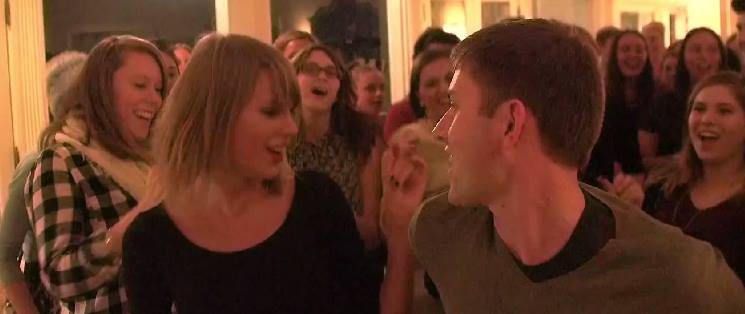
As a marketing major entering my senior year at UConn, I discussed the idea of doing an independent study with my advisor about how artists leverage social media marketing in the music industry. Starting off, I needed to pick a specific artist and track their use of social media to investigate its effect on music sales. Needless to say, I picked Taylor Swift, who I’ve been an active fan of for years.
Throughout September, I researched Swift’s social media evolution from creating a MySpace account up through her joining Twitter, Instagram and Tumblr. I simultaneously reviewed her music sales and chart positions to see if I could connect the link between social media and sales. I noticed that Swift develops personal relationships with her fans by using social media as a channel to communicate not only her music, but also herself, as a person.
On a Thursday afternoon in early October I received a call from Swift’s team asking me to be a part of an exclusive Taylor Swift-related opportunity in two days. The invitation sounded almost too good to be true. So Saturday afternoon I traveled to Rhode Island, and I was subsequently shuttled over to Swift’s home. The entire experience was surreal.
I spent Saturday night at her home with several other fans and essentially hung out with Taylor Swift. We listened to the new album “1989” and got to hear the personal stories behind the songs. The listening session ended with a dance party to the lead single off the album “Shake It Off” where she singled me out amongst the crowd to dance with until the end of the song. Needless to say, I felt as if I was living in a daydream. That night we learned Swift and her team selected us because they had been looking for everyday, loyal fans on social media for months. Ironically, I became a part of my own social media project!
 Upon getting home, I posted a Polaroid picture of Taylor and myself from the night on my social media accounts, and even my close friends were quick to dismiss it as photoshopped. The next morning, I woke up to find Taylor, herself, had Tweeted and Instagrammed our photo, validating the entire experience and essentially bringing my social media project full-circle.
Upon getting home, I posted a Polaroid picture of Taylor and myself from the night on my social media accounts, and even my close friends were quick to dismiss it as photoshopped. The next morning, I woke up to find Taylor, herself, had Tweeted and Instagrammed our photo, validating the entire experience and essentially bringing my social media project full-circle.
A few weeks later, she posted a YouTube video that shows a behind-the-scenes look at the Secret Sessions she held at each of her four homes across the country. Fortunately, my one-on-one dancing session made the cut, which allows me to relive the entire experience.
So here I am back in the present, and all I can ask myself is this: what could the future possibly hold for me now? To be honest, I don’t have an answer, but I think Swift sums it up best with this lyric,
“It’s like I’ve got this music in my mind saying it’s gonna be alright.”
And it will be.
-Marc Castonguay
 wart Lander (UConn, ‘80) has been named the 2013-14 Outstanding Alumnus by the Marketing Department. The Marketing Department has been privileged to have Stewart as a friend for many years. We are very appreciative of the Lander Family Scholarship that Stewart and his wife, Pam, established, which provides financial support to some of our best students in the professional sales leadership area. Stewart has been integral to our Program for Sales Leadership as a member of the PSL Advisory Committee, contributing valuable insights and perspectives on professional selling trends that have enhanced our ongoing experiential learning curriculum initiatives. He has given generously of his time to mentoring our students and giving guest lectures in our undergraduate sales-focused courses, and graduate marketing courses.
wart Lander (UConn, ‘80) has been named the 2013-14 Outstanding Alumnus by the Marketing Department. The Marketing Department has been privileged to have Stewart as a friend for many years. We are very appreciative of the Lander Family Scholarship that Stewart and his wife, Pam, established, which provides financial support to some of our best students in the professional sales leadership area. Stewart has been integral to our Program for Sales Leadership as a member of the PSL Advisory Committee, contributing valuable insights and perspectives on professional selling trends that have enhanced our ongoing experiential learning curriculum initiatives. He has given generously of his time to mentoring our students and giving guest lectures in our undergraduate sales-focused courses, and graduate marketing courses.

 Upon getting home, I posted a Polaroid picture of Taylor and myself from the night on my social media accounts, and even my close friends were quick to dismiss it as photoshopped. The next morning, I woke up to find Taylor, herself, had Tweeted and Instagrammed our photo, validating the entire experience and essentially bringing my social media project full-circle.
Upon getting home, I posted a Polaroid picture of Taylor and myself from the night on my social media accounts, and even my close friends were quick to dismiss it as photoshopped. The next morning, I woke up to find Taylor, herself, had Tweeted and Instagrammed our photo, validating the entire experience and essentially bringing my social media project full-circle.